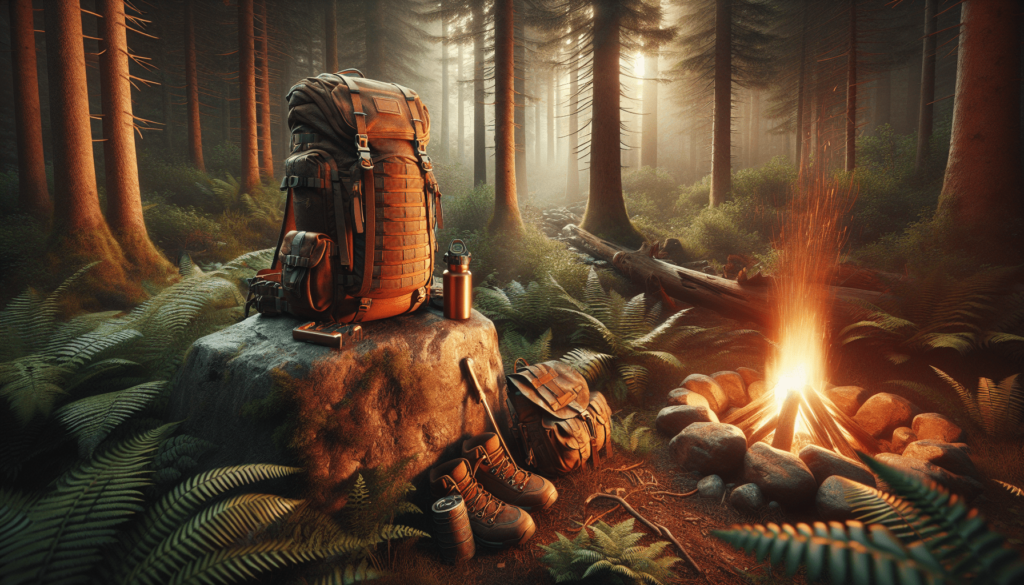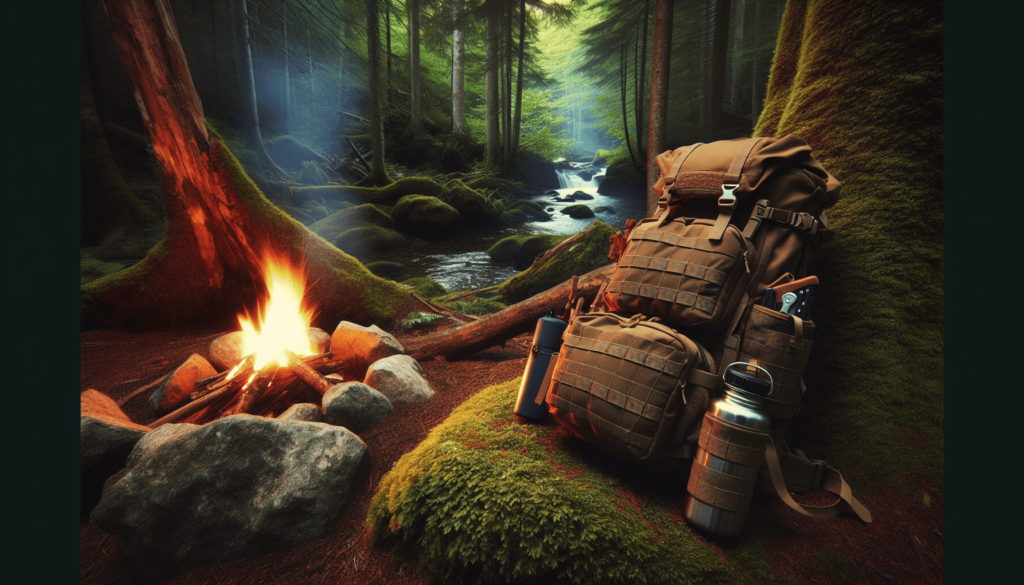
Have you ever wondered what the essential resources for survival are? We might find ourselves pondering this question while watching yet another episode of a survival show or during a riveting conversation with friends about doomsday scenarios. We’re not talking about the latest or greatest gadgets – no, we’re talking about good old-fashioned necessities.

Why Are Resources for Survival Important?
Before diving into the nitty-gritty, let’s take a moment to reflect on why survival resources matter so much. In the wild, whether it’s a sudden hiking trip gone awry or an unexpected natural disaster, certain resources make the difference between life and death. It’s kind of like that time we tried to bake a cake without flour; you quickly realize what you absolutely cannot do without.
Basic Survival Scenario
Imagine it’s the middle of winter, and our car breaks down in a remote area. Instead of a cozy evening by the fireplace, we’re staring at miles of snow and no help in sight. What now? Knowing what we need and how to use it becomes paramount.
Mindset and Preparation
Equally important is our mindset. Being mentally prepared to handle a critical situation and having a plan in place often makes all the difference. We’re essentially talking about putting ourselves in the best position to thrive despite the odds.
Evolution and Instincts
Our ancestors survived by instinct, and while we might not need to fend off saber-toothed tigers today, those instincts are still within us. We just need to know how to awaken and rely on them.
The Five Key Resources for Survival
So, let’s dissect what these five must-have resources are for us to survive when the chips are down.
1. Water
The mundane action of turning on the tap belies the significance of water in our daily lives. In survival situations, water becomes a matter of urgency. Our bodies are roughly 60% water, and we can only survive a few days without it.
Finding Water
In the wild, water sources can be hidden gems. Rivers, lakes, and streams are obvious, but we can also find water in plants, moisture-rich soil, or morning dew.
Purifying Water
Of course, we can’t just drink water from any source without considering contaminants. Various methods, like boiling water, using purification tablets, or filtering through a portable device, come in handy. Think of it as upgrading from drinking from a puddle to sipping from a cozy teapot—simple steps, big improvement.
2. Food
We can’t go long without food either. While water keeps us hydrated, food provides the nutrients and energy we need to keep moving.
Foraging and Hunting
Foraging is an art. Wild berries, nuts, and edible plants can boost our energy levels remarkably. Now, hunting and fishing require skill, patience, and the right equipment, but these methods can provide a more substantial energy source if done correctly.
Food Storage
Storage is key when we’ve got a bounty. We’re not talking about Tupperware here, but rather proper methods like drying or smoking meats and storing nuts and berries in cool, dry places. It’s like packing our own lunch box, just in a more primal, life-sustaining manner.
3. Shelter
Finding or creating shelter is crucial to protect against the elements whether it’s sweltering heat, freezing cold, or relentless rain. Shelter keeps us safe from the environment and the creatures within it.
Building Shelter
Constructing a shelter involves using available resources, such as branches, leaves, and even snow, to create a safe haven. It’s akin to an impromptu sleepover fort but exponentially more essential for our well-being.
Types of Shelter
We might build a lean-to, snow cave, or debris hut, depending on the environment. The aim is to insulate and protect, ensuring our proverbial house on the prairie keeps us warm and dry through the night.
4. Fire
Fire is not just about warmth; it’s a survival tool with multifaceted uses. It can cook food, purify water, provide light, and keep wildlife at bay.
Starting a Fire
Imagine trying to start a campfire while surrounded by damp wood and no matches. There’s a reason fire-starting methods like the hand drill, bow drill, or flint and steel feel like something out of a Boy Scout manual. Practice makes perfect!
Fire Maintenance
Once we’ve got it going, maintaining the fire is another challenge. Managing the fuel supply, ensuring proper airflow, and avoiding an all-out forest fire are all critical steps.
5. Safety and First Aid
Accidents happen, especially in survival situations. Knowing how to treat injuries and protect ourselves can mean the difference between recovery and further harm.
First Aid Kits
A well-stocked first aid kit can be a lifesaver, quite literally. Bandages, antiseptic wipes, tweezers, and pain relief medications form the basic staples of our survival med-kit.
Emergency Response
Knowing CPR, how to treat wounds, or even recognizing signs of hypothermia can be the turning point in dire circumstances. It’s like having a pocket-sized emergency room; not glamorous, but potentially life-saving.
Summary of the Essentials
Let’s summarize our five key resources for survival in an easily digestible way:
| Resource | Essential Actions |
|---|---|
| Water | Finding, purifying, and storing |
| Food | Foraging, hunting, and preserving |
| Shelter | Building and insulating |
| Fire | Starting, maintaining, and safely using |
| Safety/First Aid | Carrying a kit and knowing emergency responses |
Situational Survival
These five resources are universal, but how we gather and utilize them often depends on the situation. So, let’s examine a few typical survival scenarios and how these principles adapt to each.
Wilderness Survival
Imagine we’re lost in dense forest terrain. Navigating, establishing shelter, finding water, and sourcing food become immediate priorities. Fire is indispensable for cooking, warmth, and signaling for help. Here, our first aid skills are often the first line of defense against cuts, bruises, and potentially more serious injuries.
Urban Survival
In an urban environment after a natural disaster, resources are different but just as vital. Water might come from emergency supplies or stored reserves, while food could be scavenged or rationed from pantries. Shelter might be a structurally sound building, and fire could be substituted by other forms of heating like gas stoves.
Desert Survival
In a desert, water is scarce and becomes the top priority. Shelter from the sun is crucial, often requiring us to construct a shade or dig a trench. Food sources may include small animals or insects, and fire aids significantly at night when temperatures plummet.
Water Survival
If stranded at sea, desalination of water becomes critical. Fishing provides the primary food source, and improvised shelter might involve creating shade on a raft or boat. Keeping warm and signaling for rescue are the main roles of fire, if it’s even possible to construct one.

The Importance of Knowledge and Skills
Having resources is one thing, but knowing how to use them effectively is another. Skills and knowledge often trump sheer availability.
Practicing Skills
How many of us actually practice starting a fire without matches, or identifying edible plants? These aren’t just skills for scouts; they are practical survival abilities everyone should have a basic understanding of.
Educating Ourselves
Reading survival manuals or taking a basic first aid course can prepare us for situations we might never think we’ll face—until we do. It’s like having a superpower; better to have it and not need it than the other way around.
Psychological Aspects of Survival
Survival isn’t just physical; it’s also a mental battle. Maintaining a positive attitude, staying calm, and keeping our wits about us significantly influence our success.
Mind Over Matter
Our brains are our most potent survival tools. Anxiety and panic can lead us astray, while clear-headed thinking and calm decision-making keep us on the right track.
Self-Awareness
Being aware of our limitations and knowing when to push forward or rest is crucial. Our mental health directly impacts our physical well-being, and a clear head can often solve many problems simply through rational response and perseverance.
Community and Teamwork
When we’re with others, survival becomes a team effort. Companionship not only helps with the physical tasks but provides emotional support too.
Dividing Responsibilities
In a group, dividing tasks like water collection, food foraging, and first aid ensures efficiency. Think of it as a survival-themed potluck; everyone brings something to the table.
Moral Support
Having someone to lean on, to keep spirits high, or to share the burden can make the grimmest situations bearable. It’s the difference between feeling utterly alone and knowing we’re in this together.
Technology and Modern Aids
Despite our focus on fundamental resources, modern technology can significantly aid our survival prospects.
Emergency Gadgets
Tech-savvy solutions like GPS devices, satellite phones, solar-powered chargers, and water purifiers are game-changers. It’s almost like letting technology bring some of the convenience of daily life into a survival setting.
Balancing Traditional and Modern Techniques
While we shouldn’t solely rely on tech—batteries die, signals fail—modern aids complement traditional skills, creating a hybrid approach to survival tactics.
Conclusion
Survival is both an art and a science, requiring knowledge, preparation, and resilience. While the five essential resources—water, food, shelter, fire, and safety/first aid—form the backbone of our survival strategy, it’s our skills, mindset, and teamwork that enable us to make the most of these resources.
We’ve explored why these resources are crucial and how to manage them across various scenarios. More importantly, we’ve seen how preparation and a calm, positive mindset make all the difference.
Let’s arm ourselves with knowledge and practice these skills, ensuring we’re ready to handle whatever comes our way. After all, when it comes to survival, preparation isn’t just about staying alive; it’s about truly living.
